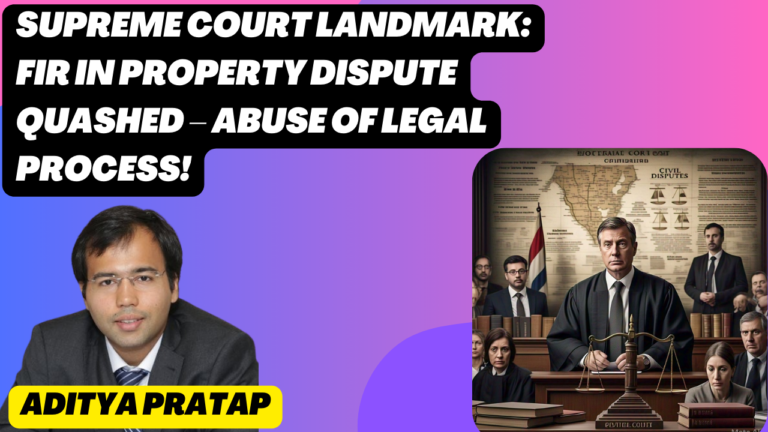
Supreme Court Quashes FIR in Property Dispute, Calls It Abuse of Legal Process
In a landmark judgment, Jit Vinayak Arolkar v. State of Goa & Ors, delivered on January 6, 2025, the Supreme Court of India ruled that filing a criminal case related to cheating in a property dispute, long after civil suits were filed, constitutes an abuse of the legal process.
The case involved an FIR filed against Goa MLA Jit Vinayak Arolkar, leader of the Maharashtra Gomantak Party, in a property transaction dispute over land located in Pernem, Goa. A bench comprising Justices Abhay S. Oka and Ujjal Bhuyan quashed the FIR, emphasizing the misuse of criminal proceedings in an ongoing civil matter.
Background of the Case
The property in question, located in Dhargalim Village, Pernem, Goa, was described as “CAPNIVORIL GUERA” and registered under Sy. No. 481/0 in the Land Registration Office of Bardez. The complainant (4th respondent) had filed twelve civil suits in 2018, claiming ownership or an undivided share of the property inherited from his father.
In October 2020, two years after initiating the civil suits, the complainant’s attorney lodged a criminal complaint accusing Arolkar of selling portions of the property without consent, alleging fraud under Section 420 of the IPC. The FIR led to anticipatory bail for Arolkar in February 2021. However, a subsequent writ petition filed by Arolkar to quash the FIR was dismissed by the Bombay High Court in March 2023, prompting the appeal to the Supreme Court.
Legal Issues and Arguments
Appellant’s Submissions:
Arolkar’s counsel argued that the FIR was filed two years after the civil suits were initiated, proving it was mala fide and intended to harass the appellant. The legal heirs of Sacarama Sadassiva Natecar, represented by Arolkar, had sold the property through duly executed sale deeds.
The counsel highlighted the ongoing civil suits and asserted there was no evidence of cheating under Section 415 of the IPC. They contended that the complaint lacked merit since the respondent had admitted to co-ownership rights in the sale deeds, negating the allegations of fraud.
Respondent’s Submissions:
The respondent’s counsel argued that Arolkar had sold the property to third parties, disregarding co-ownership rights. Citing M/s Neeharika Infrastructure Pvt. Ltd. v. State of Maharashtra (2021), the respondent emphasized that criminal proceedings should not be quashed at the initial stage and that an investigation should proceed.
Supreme Court’s Analysis
The Supreme Court meticulously reviewed the facts and legal arguments, concluding that the FIR was an abuse of the legal process.
-
Civil Nature of the Dispute:
The Court emphasized that the dispute was fundamentally civil, revolving around property ownership and co-ownership. -
Delay in Filing the FIR:
The FIR, filed two years after the civil suits began, weakened the claim of urgency or criminality. -
No Evidence of Cheating:
The Court noted that no deception was evident in the transactions. The sale deeds executed by Arolkar were lawful, and no complaints were raised by the purchasers. -
No Allegation of Forgery or Deception:
There were no claims that Arolkar had forged documents or made fraudulent representations to the respondent.
The Court ruled that initiating criminal proceedings under such circumstances amounted to malice and interference in civil proceedings.
Bombay High Court’s Role
The Bombay High Court, on March 1, 2023, had refused to quash the FIR, citing the need for further investigation. However, the Supreme Court overturned this ruling, highlighting that the criminal complaint’s timing undermined its credibility and interfered with ongoing civil litigation.
Supreme Court’s Conclusion
The Supreme Court quashed the FIR against Arolkar, setting aside the Bombay High Court’s judgment. It clarified that this ruling did not affect the merits of the ongoing civil dispute, which would proceed independently. The judgment underscores the judiciary’s role in preventing the misuse of criminal law in civil disputes.
Conclusion
The ruling in Jit Vinayak Arolkar v. State of Goa serves as a critical precedent in handling property disputes. It reiterates the principle that civil and criminal remedies must be distinct and that criminal law should not be misused to harass parties in civil disputes. This judgment reinforces the judiciary’s commitment to upholding justice and discouraging malicious litigation.

About the Author
Aditya Pratap is a practicing lawyer and founder of Aditya Pratap Law Offices based in Mumbai. An alumnus of NALSAR University of Law, Hyderabad, he has over 11 years of experience and has handled numerous cases of public and private significance. For more insights, you can visit his website: adityapratp.in. Watch him in TV interviews.